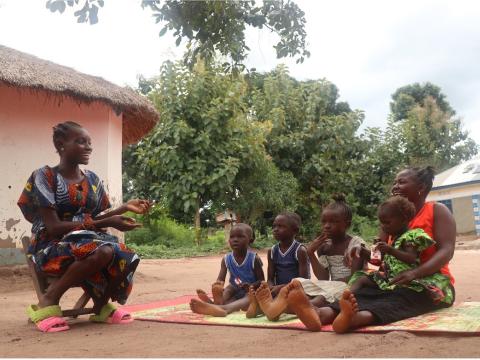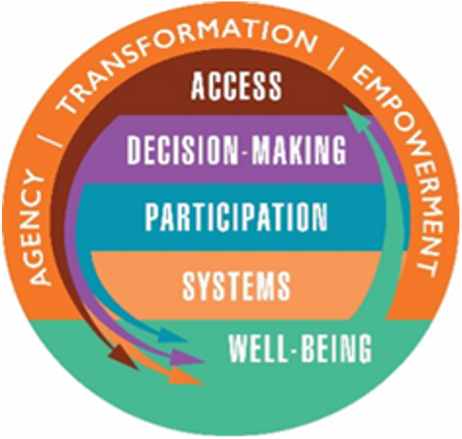Meet Christine: A story about how a woman’s ability to make decisions improved the lives and well-being of her community

In many parts of South Sudan, community members especially women do not turn up for health services because they lack knowledge of their importance. However, once health educated, they are able to make personal decisions concerning their health and that of their children. Christine's story encourages every service provider to create awareness of the existing health services so that women are particularly equipped with the knowledge to make informed decisions about their health.
Western Equatoria is deeply rooted in traditional and cultural norms. It is a community that is heavily dominated by men and women have a very limited say when it comes to matters of the family and community. Culturally, women are expected to produce as many children as possible. Traditionally, women have no say in the number of children they would want to have because that decision is generally left to men.
Christine John, a 30-year-old mother, explained that many men in the community put a lot of pressure on women to produce children for reasons that many lives were lost during the war. Additionally, girl children are considered a source of wealth, and boys are a defense for the family. The situation is worse if a woman takes longer to conceive because she will be ridiculed, stigmatized and in most cases, the husband will marry another wife. This pressure is partly the reason why women gave birth almost every year.
The only time I stayed long without conceiving is when I was sick. At this time, I was able to give a two-year gap between my son Goodwill and Given.
Christine recalls how she almost died during childbirth at home a few years ago. ‘I almost lost my life and my baby during delivery because I had no energy to push the baby.,” she said. Even after surviving death, Christine said the community still expected her to continue giving birth. She got depressed knowing that her life was on the brink of death, yet no one cared about it.
Gender Equality and Social Inclusion
 World Vision prioritizes the Gender Equality and Social Inclusion (GESI) Approach that promotes equal and inclusive access, decision-making, participation, systems, and well-being of the most vulnerable; transforms systems, social norms, and relations to enable the most vulnerable to participate in and benefit equally from development interventions, builds individual and collective agency, resilience, and action and promotes the empowerment and well-being of vulnerable children, their families and communities. The goal is to achieve sustained, transformational change at the individual, household, community, and societal levels so that all persons can enjoy fullness of life.
World Vision prioritizes the Gender Equality and Social Inclusion (GESI) Approach that promotes equal and inclusive access, decision-making, participation, systems, and well-being of the most vulnerable; transforms systems, social norms, and relations to enable the most vulnerable to participate in and benefit equally from development interventions, builds individual and collective agency, resilience, and action and promotes the empowerment and well-being of vulnerable children, their families and communities. The goal is to achieve sustained, transformational change at the individual, household, community, and societal levels so that all persons can enjoy fullness of life.
The Prioritizing GESI in Health Interventions Project in Western Equatoria sought to reach vulnerable groups such as Jessica and other persons with disabilities. The objectives were to integrate Gender equality and Social inclusion into routine health care, build the capacity of health care providers and ensure equal access to and use of health services and improve the health-seeking behavior of the poor, vulnerable, and marginalized populations so they can obtain health services based on their rights. To that effect, the project conducted health awareness campaigns to challenge harmful social norms and practices. The campaigns were packaged in such a way that women and girls such as Christine, men, and boys, as well as persons with disabilities and other vulnerable populations have equal access to correct information to be able to make informed decisions concerning their lives and that of their families. Additionally, World Vision recruited women into health facility management committees and Boma Health Committees with the overall aim of training and using them as peers and change agents among fellow women in the community. There are nearly 75 health facility committees that were established, trained, and are functioning with a female chair or co-chair. These committees have had a positive impact on women because, through them, so many women have been mobilized to take up services at the health facilities.
Christine shared her experience on the committees and she had this to say, “One day, as I was taking my daughter Stella for vaccination and I met Jenty, one of the Health Facility Committee members, and her team conducting awareness on maternal and child health. I joined the sessions and I was glad to learn a lot. Among the things I learned was family planning, and the importance of attending antenatal care and delivery at the health facility by a skilled birth attendant. They also taught us the dangers of early marriage, too-soon pregnancies, and the danger signs during pregnancy. The sessions were so good and the knowledge I got helped me to change my lifestyle’’.
World Vision also established Mother to Mother support groups (M2MSGs), Adolescent and Sexual Reproductive Health Groups (ASRH), and male champion groups which have done a long way in promoting positive health-seeking behavior and preaching the message of ‘‘Stop Violence Against Women and girls’’. In particular, the engagement of male champions contributed to the general acceptance of critical lifesaving interventions like Family Planning, Antenatal Care, and skilled birth delivery at the health facility. Jenny, one of the Health Facility Management Committee chairpersons said, ‘‘Women such as Christine are now able to make their own decisions about using family planning contraceptives, child spacing, attending antenatal services regularly, and making life-saving decisions for emergency obstetric care and/or to delivering at health facilities without seeking permission from their husbands’’.
GESI Impact
After the health education, Christine started attending antenatal care regularly. She later enrolled in family planning. After delivery, Christine noted a big change in her life. Both she and the baby were healthier and happier. She was no longer frequenting the hospital due to the sickness of the baby, unlike those days when she had not enrolled in family planning and was not utilizing the health services during pregnancy, delivery, and after delivery. Her husband was amazed and was no longer stressed by the frequent sicknesses and hospital episodes. He was able to concentrate on farm work to earn a living for the family’s upkeep and school fees. They were able to construct a decent house for themselves because Christine and her husband saved money that could have otherwise been used to pay hospital bills. Both Christine and her husband did personal reflections and concluded that the changes they were experiencing were brought about the health awareness campaigns, attending antenatal care, delivering from a health facility, and enrolling in family planning. Following the positive changes in her life and family, Christine opted to join the Mother-to-mother support group to share her testimony and use her experience to convince other mothers in the community to use health services. She said, ‘‘I must reach women and teach them to make the correct decision about their health’’
Most often, community members especially women do not turn up for services because they lack knowledge of their importance. However, once health educated, they are able to make personal decisions concerning their health and that of their children. This story encourages every service provider to create awareness of the existing health services so that women are particularly equipped with the knowledge to make informed decisions about their health.
---
The Prioritizing GESI in Health Interventions Project is funded by the Health Pooled Fund, a consolidated fund from the British Government’s Foreign, Commonwealth and Development Office, the Government of Canada, the Swedish International Development and the United States Agency for International Development, European Union and the Global Alliance for Vaccines and Immunization. The development of this success story was part of the GESI Transform Project funded by World Vision U.S.
Story by: Scovia Charles, World Vision South Sudan Communications Coordinator; Stephen Leonard Epiu, World Vision South Sudan Health, Nutrition, and Water, Sanitation and Hygiene Technical Manager; Leticia Nkonya, PhD., World Vision United States GESI Senior Technical Advisor; and Vicky Poni Mikaya, World Vision South Sudan GESI Coordinator